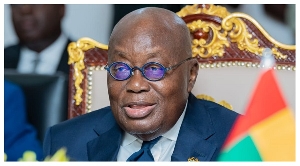General News of Thursday, 3 September 2020
Source: classfmonline.com
Stop charging to release public information - RTI Coalition
The Coalition on the Right to Information, Ghana (RTI Coalition) says it is troubled and disappointed with the kind of responses received by institutions and individuals seeking information from some public institutions under the RTI Act.
According to the RTI Coalition, while some public institutions are denying access, citing excuses such as the non-existence of basic structures to aid release of information; many other public institutions are completely ignoring requests made to them for information including some very basic public information. “These developments are very worrying.”
“A recent example of such worrying trend is the demand by the National Communication Authority (NCA) to the Media Foundation for West Africa (MFWA) to pay the unreasonable/outrageous fee of GHS2,000 to access some public information which is supposed to be proactively disclosed by the NCA without prompting per provisions of the RTI Act. Equally troubling has been the response of the Electoral Commission, upon request by a Member of Parliament (MP) for information on the acquisition of the Commission’s Biometric Voter Management System (BVMS). The Commission turned down the request by indicating that it could not honour the said request because Parliament was yet to fix the fees one had to pay in order to request for information under the RTI Act. It took the High Court to order the Electoral Commission to provide the information requested for, but at quite an exorbitant fee of One Thousand and Five Hundred Cedis (GHS 1,500.00),” the RTI Coalition stated in a statement.
The Coalition is of the opinion that exercising a fundamental human right such as the Right to Information should not be costly; otherwise, it is no more a right.
The statement further indicated that it is important for public institutions to bear in mind that, public information is already paid for by taxpayers and therefore charging requesters to search for public information is tantamount to double charging.
“This is why section 23(3) (d) of the RTI Act provides that ‘Where the Information Officer decides to give access; the notice shall state the prescribed fee for the REPRODUCTION of information’. The Act goes ahead to provide under section 75(2) (c) that ‘Despite subsection (1), a fee or charge shall not be payable for the REPRODUCTION of information which is in the public interest’.
“Furthermore, it is implied by the text of Section 75 (2), (3), (4) and (5) that the fees to be charged are the reasonable costs of reproduction of the information requested for and not the time spent in reviewing the request or preparing/searching for the information. All public institutions, without exception, are to comply with the provisions of the RTI law, including the provisions in respect of fees,” the Coalition explained in its statement.
The RTI Coalition further noted that the NCA’s response to the MFWA only send wrong signals to the public and suggest that the RTI Act is rather making it more difficult to obtain information instead of facilitating easy access to information, hence discouraging its use.
The Coalition has, thus, condemned these developments and called on the government to take immediate practical steps to prevent such acts from happening again.
The present situation, according to the Coalition, directly contradicts the Ministry of Information’s assertion that it has equipped public institutions with training on the importance and application of the RTI Act.
“Additionally, these actions/inactions by public institutions emphasise the need for government to work with stakeholders including the Coalition to implement the revised RTI implementation roadmap to facilitate the effective implementation of the RTI Act which is being touted by government as a major tool to curb corruption and promote good governance in Ghana’s burgeoning democracy.”













